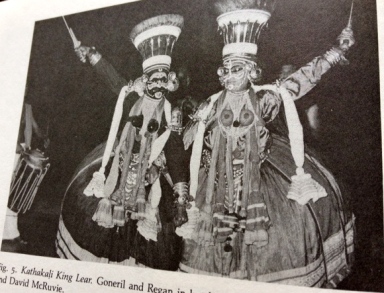When Shakespeare is deprived of his tongue
Anxieties of translation, presentation and reception in a postcolonial world
May 18th @ 5.00pm

In the UK’s 2012 Cultural Olympiad, the Globe to Globe festival commissioned 37 international theatre companies to perform Shakespeare’s 37 plays in 37 languages on the Globe stage in London. Shakespeare’s text was not provided in translation; a screen giving scene summaries was the only aide to the audience of what was happening on stage. Following this, Iqbal Khan’s Much Ado About Nothing for the Royal Shakespeare Company assembled a British Asian cast speaking Shakespeare’s original text, in a production set in contemporary old-Delhi, which performed in Stratford upon Avon before transferring to London. Both are in contrast to Tim Supple’s 2006 Indian Midsummer Night’s Dream, which brought together all-Indian and Sri Lankan practitioners under an English director, used indigenous music, and attempted to faithfully translate the play into several Indian languages to accurately reflect both Shakespeare’s metre and a version of the multilingual reality of daily Indian urban life. No translation back to English was offered. This production toured across India and internationally. Finally, in India’s 2012 Bharat Rang Motsav, Suman Mukhopadhyay’s King Lear offered the play in performance in Bengali, while a screen above the proscenium provided line-by-line translation of the Bengali into the contemporary hybrid of Hindi and English: Hinglish.
My research considers whether Shakespeare’s text will cease to matter (and whether this matters itself) as audiences with no familiarity of the plays, watch them in languages they also don’t understand; languages ‘other’ to Shakespeare’s revered idiom. Examining how particular translations were effected, presented, and received reveals some of the underlying politics of perception and post-colonial anxiety that still surrounds cross-cultural approaches to Shakespeare and his work. In the alchemical space between original text and translation, and where text meets performance, such attitudes are challenged. My work draws on feminist and postcolonial theory and creative practice, and ultimately argues that as fresh linguistic and cultural understandings are formed, Shakespeare’s text itself is submerged and renewed; thus it might endure through endless permutations even as its importance seems to fall away. This presentation is part of my practice-based thesis on King Lear, which I read as a gendered and postcolonial text in order to interrogate both its place in India’s history, and paradigms of behaviour in India today.
Brief Bio
Preti Taneja is a Visiting Lecturer and Doctoral researcher in Creative Writing at Royal Holloway, University of London, and Creative submissions editor of the online journal Exegesis. She is also a journalist and filmmaker specialising in human rights. Her campaigning documentaries from Kenya and Rwanda among other places can be seen on erafilms.co.uk. The award winning feature film ‘Verity’s Summer’ which deals with secrets surrounding British involvement in the torture of Iraqi detainees, is on general release in cinemas and online in 2013. veritys-summer.com
+ See Lear’s Indian Daughters: http://bloggingshakespeare.com/lears-indian-daughters